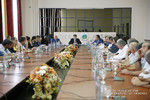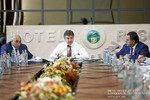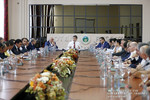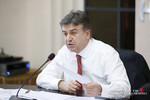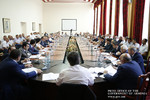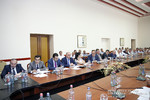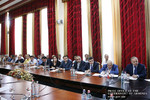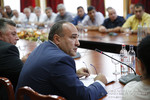Saturday, 22 July 2017
“We need to provide modern, high-quality education in border communities” – PM Holds Consultation in Tavush Marzof Armenia
The Prime Minister-chaired consultation in Dilijan town of Tavush Marz discussed Marz and community development programs and activities.
Tavush Marz Governor Hovik Abovyan noted that the Marz boasts a 2.0% share in the country’s total GDP. 2016 The gross industrial output is about 12,130 billion drams, while the gross agricultural output is AMD 41, 300 million. Agriculture is seen as a priority in the region’s development strategy.
As he said, thanks to international and local organizations, as well as private investments, hothouse, fruit drying and refrigeration facilities are being built, gardens and processing facilities established in the Marz. The number of such entities has already exceeded 200, with more than 400 jobs provided.
On Prime Minister’s instructions, 20 investment projects to a total cost of 2, 400 million drams have been submitted to the government. Of these, 12 have been approved. A multi-harvest strawberry greenhouse farm is being set up by Berk LLC. Other projects are under consideration at this point of time.
As the Governor reported, communities’ own revenues amount to about AMD 921.3 million. By the end of the year, they are expected to grow due to new agreements on garbage disposal and the creation of a community market in Noyemberyan.
There are 4 enlarged communities formed in Dilijan, Noyemberyan, Koghb and Ayrum. The enlargement process in Berd region will kick off in the fall of 2017. All 40 communities of the province have five-year development programs. As part of the Clean Armenia Program, a series of supplementary clean-ups were held on April 15; similar cleaning activities are scheduled for July 29.
Karen Karapetyan first of all drew attention to low community revenue and garbage collection levels. “The tariffs we are talking about are not a serious or insurmountable burden for our citizens. Here is an unsettled problem. You neither shoulder a burden nor set up tariffs and regulations; all you do is ask for funding from the State budget. We have simply and clearly stated that community subsidies shall be based on the following principle: money will be given not to the weakest, but those who take on more of the burden.”
The Head of Government instructed the Governor to work with interested organizations and in the shortest possible time provide an analysis of each community’s own reevenue and the expected amounts of waste collection sums.
The Prime Minister was informed about the work done in the field of agriculture, healthcare, education, tourism. In particular, information was provided about the establishment of intensive gardens, improvement of tourism infrastructure, activities of educational and healthcare systems and optimization.
The Head of Agriculture and Environment Department reported that 22.3 hectares of intensive orchards had been established in the region in recent years. Should there be a nursery, these gardens could be expanded at the rate of up to 50 hectares per year.
The Prime Minister noted that analyses and estimates show the establishment of intensive orchards in the agricultural sector may be promising and will provide a significant GDP increase.
Speaking about the educational system reforms, Karen Karapetyan attached importance to the provision of quality education. “Optimization is not an end in itself. No illogical decision will be made to save money at the expense of our children and citizens. We just say we are not going to spend illogical money. Undoubtedly, a unified approach will be shown to border communities. It is crucial for us to change the focus of consultations like this within 10-15 years. Today, we must provide our children with quality education so that the next generation would more intelligent, rational, patriotic and active. It is extremely important for us to do our best to provide modern, high-quality education in border communities,” the Prime Minister emphasized.
The Head of the Education Department of Marz Administration presented the work aimed at organizing the educational process more efficiently. 5 local schools were said to have held video lessons with other schools in the country: the results were positive and it is envisaged to apply the experience in the schools of other border communities. The main problem is the availability of Internet, and work is being done to solve it.
The Head of Government instructed the concerned departments to quickly discuss the issue and find optimal solutions. The Prime Minister was also briefed on the programs aimed at promoting small and medium-size enterprise and developing tourism in Tavush Marz. The meeting discussed their expediency and ways of providing State support to these programs. The meeting also touched upon the vision of the development of major urban communities in the region and the steps taken to use the existing potential, which according to the Prime Minister’s estimation, are still insufficient.
Karen Karapetyan suggested submitting to the Government business plans supported by accurate calculations and financial estimates. Concerning the need to improve the business environment in the region, the Prime Minister told those responsible to reveal the existing problems within a short period of time, highlight the development prospects and develop a policy that will help boost economic development in the region, create new jobs and enhance the living standards of the population.







